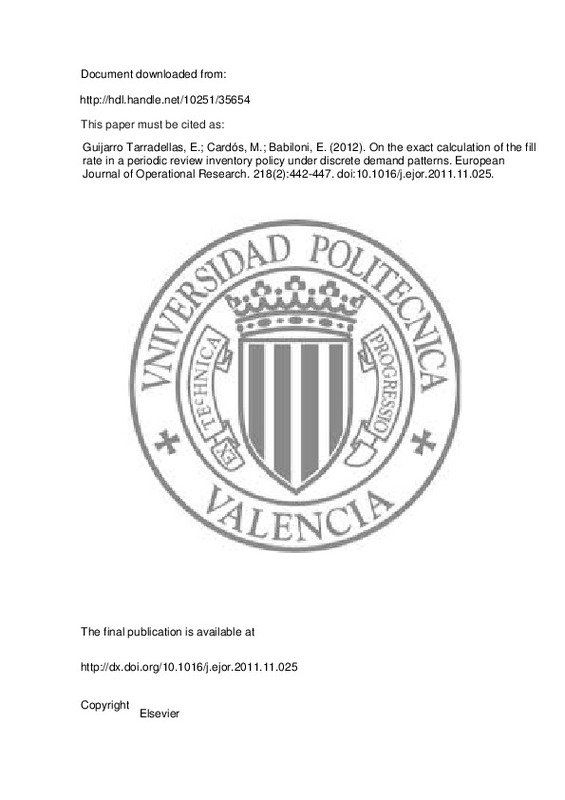JavaScript is disabled for your browser. Some features of this site may not work without it.
Buscar en RiuNet
Listar
Mi cuenta
Estadísticas
Ayuda RiuNet
Admin. UPV
On the exact calculation of the fill rate in a periodic review inventory policy under discrete demand patterns
Mostrar el registro sencillo del ítem
Ficheros en el ítem
| dc.contributor.author | Guijarro Tarradellas, Ester
|
es_ES |
| dc.contributor.author | Cardós, Manuel
|
es_ES |
| dc.contributor.author | Babiloni, Eugenia
|
es_ES |
| dc.date.accessioned | 2014-02-14T10:32:45Z | |
| dc.date.issued | 2012-04-12 | |
| dc.identifier.issn | 0377-2217 | |
| dc.identifier.uri | http://hdl.handle.net/10251/35654 | |
| dc.description.abstract | The primary goal of this paper is the development of a generalized method to compute the fill rate for any discrete demand distribution in a periodic review policy. The fill rate is defined as the fraction of demand that is satisfied directly from shelf. In the majority of related work, this service metric is computed by using what is known as the traditional approximation, which calculates the fill rate as the complement of the quotient between the expected unfulfilled demand and the expected demand per replenishment cycle, instead of focusing on the expected fraction of fulfilled demand. This paper shows the systematic underestimation of the fill rate when the traditional approximation is used, and evises both the foundations of the traditional approach and the definition of fill rate itself. As a result, this paper presents the following main contributions: (i) a new exact procedure to compute the traditional approximation for any discrete demand distribution; (ii) a more suitable definition of the fill rate in order to ignore those cycles without demand; and (iii) a new standard procedure to compute the fill rate that outperforms previous approaches, especially when the probability of zero demand is substantial. This paper ocuses on the traditional periodic review, order up to level system under any uncorrelated, discrete and stationary demand pattern for the lost sales scenario. | es_ES |
| dc.description.sponsorship | The authors would like to thank the two anonymous referees for their thorough reading and very constructive comments on earlier versions of this paper. This work was part of a project supported by the Universitat Politecnica de Valencia, Ref. PAID-06-11/2022. | en_EN |
| dc.language | Inglés | es_ES |
| dc.publisher | Elsevier | es_ES |
| dc.relation.ispartof | European Journal of Operational Research | es_ES |
| dc.rights | Reserva de todos los derechos | es_ES |
| dc.subject | Inventory | es_ES |
| dc.subject | Fill rate | es_ES |
| dc.subject | Periodic review | es_ES |
| dc.subject | Discrete demand | es_ES |
| dc.subject | Lost sales | es_ES |
| dc.subject.classification | ORGANIZACION DE EMPRESAS | es_ES |
| dc.title | On the exact calculation of the fill rate in a periodic review inventory policy under discrete demand patterns | es_ES |
| dc.type | Artículo | es_ES |
| dc.identifier.doi | 10.1016/j.ejor.2011.11.025 | |
| dc.relation.projectID | info:eu-repo/grantAgreement/UPV//PAID-06-11-2022/ | es_ES |
| dc.rights.accessRights | Abierto | es_ES |
| dc.contributor.affiliation | Universitat Politècnica de València. Departamento de Organización de Empresas - Departament d'Organització d'Empreses | es_ES |
| dc.description.bibliographicCitation | Guijarro Tarradellas, E.; Cardós, M.; Babiloni, E. (2012). On the exact calculation of the fill rate in a periodic review inventory policy under discrete demand patterns. European Journal of Operational Research. 218(2):442-447. https://doi.org/10.1016/j.ejor.2011.11.025 | es_ES |
| dc.description.accrualMethod | S | es_ES |
| dc.relation.publisherversion | http://dx.doi.org/10.1016/j.ejor.2011.11.025 | es_ES |
| dc.description.upvformatpinicio | 442 | es_ES |
| dc.description.upvformatpfin | 447 | es_ES |
| dc.type.version | info:eu-repo/semantics/publishedVersion | es_ES |
| dc.description.volume | 218 | es_ES |
| dc.description.issue | 2 | es_ES |
| dc.relation.senia | 207830 | |
| dc.contributor.funder | Universitat Politècnica de València | es_ES |







![[Cerrado]](/themes/UPV/images/candado.png)

